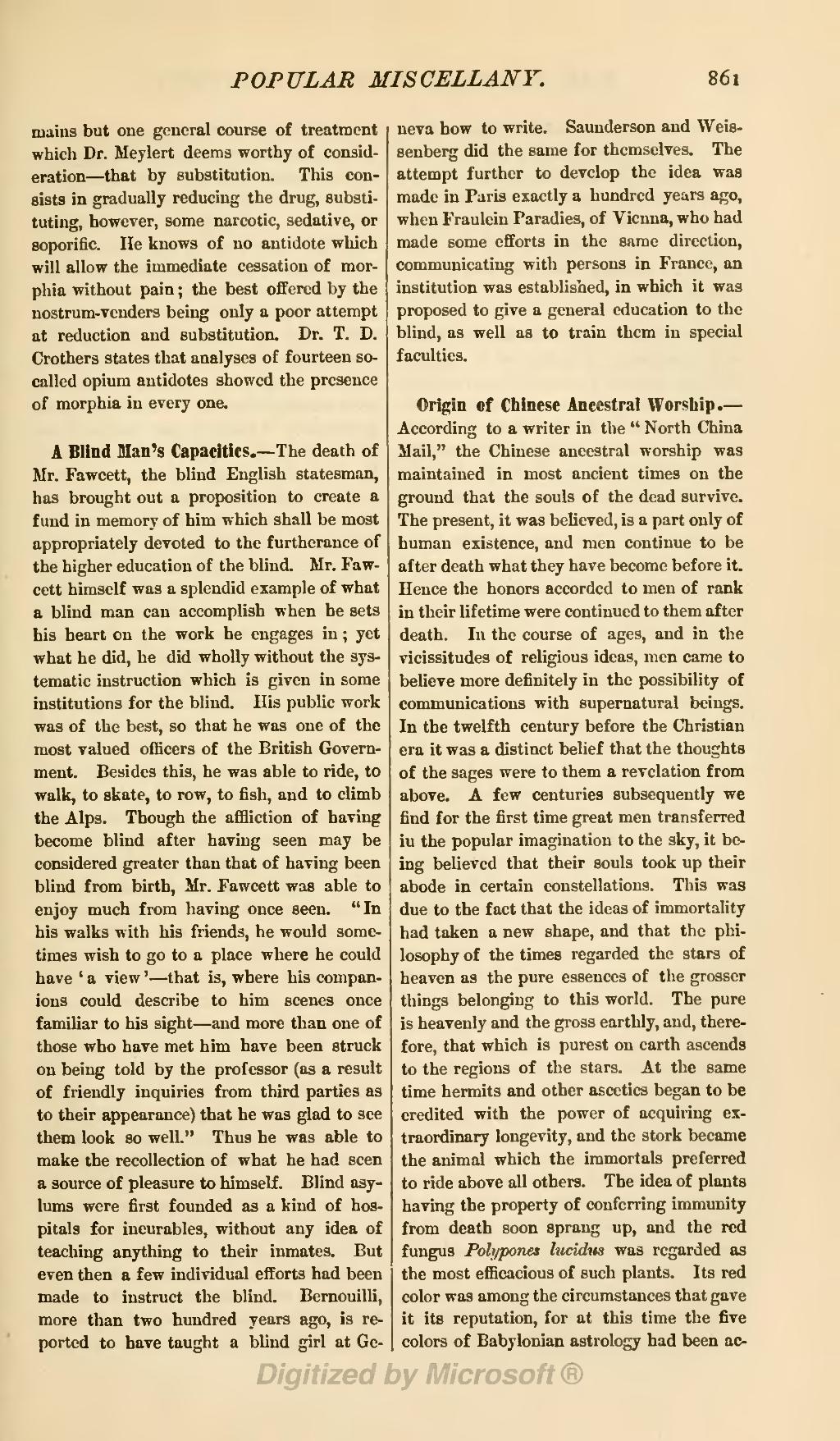mains but one general course of treatment which Dr. Meylert deems worthy of consideration—that by substitution. This consists in gradually reducing the drug, substituting, however, some narcotic, sedative, or soporific. He knows of no antidote which will allow the immediate cessation of morphia without pain; the best offered by the nostrum-venders being only a poor attempt at reduction and substitution. Dr. T. D. Crothers states that analyses of fourteen so called opium antidotes showed the presence of morphia in every one.
A Blind Man's Capacities.—The death of Mr. Fawcett, the blind English statesman, has brought out a proposition to create a fund in memory of him which shall be most appropriately devoted to the furtherance of the higher education of the blind. Mr. Fawcett himself was a splendid example of what a blind man can accomplish when be sets his heart on the work he engages in; yet what he did, he did wholly without the systematic instruction which is given in some institutions for the blind. His public work was of the best, so that he was one of the most valued officers of the British Government. Besides this, he was able to ride, to walk, to skate, to row, to fish, and to climb the Alps. Though the affliction of having become blind after having seen may be considered greater than that of having been blind from birth, Mr. Fawcett was able to enjoy much from having once seen. "In his walks with his friends, he would sometimes wish to go to a place where he could have 'a view'—that is, where his companions could describe to him scenes once familiar to his sight—and more than one of those who have met him have been struck on being told by the professor (as a result of friendly inquiries from third parties as to their appearance) that he was glad to see them look so well." Thus he was able to make the recollection of what he had seen a source of pleasure to himself. Blind asylums were first founded as a kind of hospitals for incurables, without any idea of teaching anything to their inmates. But even then a few individual efforts had been made to instruct the blind. Bernouilli, more than two hundred years ago, is reported to have taught a blind girl at Geneva how to write. Saunderson and Weissenberg did the same for themselves. The attempt further to develop the idea was made in Paris exactly a hundred years ago, when Fraulein Paradies, of Vienna, who had made some efforts in the same direction, communicating with persons in France, an institution was established, in which it was proposed to give a general education to the blind, as well as to train them in special faculties.
Origin of Chinese Ancestral Worship.—According to a writer in the "North China Mail," the Chinese ancestral worship was maintained in most ancient times on the ground that the souls of the dead survive. The present, it was believed, is a part only of human existence, and men continue to be after death what they have become before it. Hence the honors accorded to men of rank in their lifetime were continued to them after death. In the course of ages, and in the vicissitudes of religious ideas, men came to believe more definitely in the possibility of communications with supernatural beings. In the twelfth century before the Christian era it was a distinct belief that the thoughts of the sages were to them a revelation from above. A few centuries subsequently we find for the first time great men transferred in the popular imagination to the sky, it being believed that their souls took up their abode in certain constellations. This was due to the fact that the ideas of immortality had taken a new shape, and that the philosophy of the times regarded the stars of heaven as the pure essences of the grosser things belonging to this world. The pure is heavenly and the gross earthly, and, therefore, that which is purest on earth ascends to the regions of the stars. At the same time hermits and other ascetics began to be credited with the power of acquiring extraordinary longevity, and the stork became the animal which the immortals preferred to ride above all others. The idea of plants having the property of conferring immunity from death soon sprang up, and the red fungus Polypones lucidus was regarded as the most efficacious of such plants. Its red color was among the circumstances that gave it its reputation, for at this time the five colors of Babylonian astrology had been ac-

